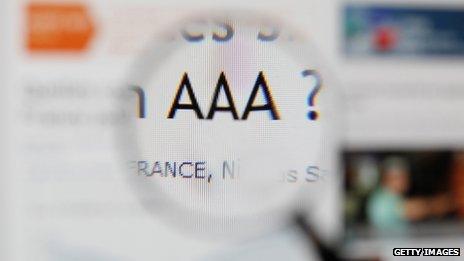Will the UK lose its AAA, and does it matter?
- Published
- comments

Will the UK lose its AAA and does it matter?
The answer to the first question is "probably" - although the timing is uncertain.
And the answer to the second question is, "Possibly not, in an economic sense, but probably a good deal, in a political sense."
The reason the AAA is in jeopardy is that the government is taking a bit longer than it promised to stabilise public sector debt as a percentage of GDP.
Even with the benefit of the significant new interest rate subsidy the government receives on the third of its debt held by the Bank of England, and despite a windfall of more than £28bn from the liquidation of assets held in Royal Mail's pension fund, public sector net debt is rising far faster and for longer than the Treasury hoped a year ago (although, to further confuse like-for-like comparisons, there is also a negative impact from reclassifying Northern Rock and Bradford & Bingley debt).
So, on the definitions used in this country, net debt now peaks at 79.9% of GDP (the annual value of what the UK produces) in 2015-16, before falling very slightly to 79.2%.
And on the eurozone's calculation, UK public sector debt reaches a peak of 97.4% in 2015/16 (remember that France lost its AAA on the basis of a profile for the evolution of its debt not conspicuously worse than the UK's - although arguably with fewer available economic remedies, because of its membership of the currency union).
The important comparator is this: 18 months ago, the Office for Budget Responsibility (OBR) was forecasting that public sector net debt would reach its peak a year earlier, in 2014-15, and it thought that peak would be considerably lower - 70.9% of GDP (87.2% on the eurozone's basis).
To put all this in slightly less befuddling terms, the UK government now expects to owe its creditors £1.442tn by 2016/16, which is £83bn more than it was forecasting 18 months ago for future debt.
And the other relevant point is that there is plenty of evidence that once public sector debt reaches that range of 80-100% of GDP, economic performance suffers.
That's one reason why the chancellor has decided that public spending cuts and tax rises, or the cliched austerity, have to roll relentlessly on until at least 2018.
Anyway, to get back to the question of the AAA, if the credit rating agencies had a high degree of confidence that public sector net debt would indeed reach a peak of almost 80% in 2015/16, then the UK might retain its AAA.
For example, Moody's - which has a "negative outlook" on the UK's credit rating - recently said that what mattered was that the UK's "debt metrics" should "stabilise within the next 3-4 years".

Credit ratings agency Moody's has a negative outlook on the UK
This all-important confidence in an end to the rising burden of debt is umbilically linked to what happens to economic growth in the coming weeks and months - because growth determines the tax revenues the Treasury is likely to receive.
Since the crash of 2008, the UK economy has consistently performed far worse than expected by the OBR and most independent forecasters.
If you believe that the UK's luck has now changed, and that future economic surprises will be positive, then the UK may just keep the triple AAA.
If on the other hand you fear that most forecasters are still failing to properly capture the negative impact of "deleveraging" - or households, businesses, banks and the government trying to cut their big debts - and if you see a serious risk of a further worsening in the eurozone's mess, then you would question whether even the anaemic recovery expected by the OBR in 2013 will take place.
As it happens, research by Professor Costas Milas of Liverpool University suggests that the latest deterioration in the UK's fiscal prospects should not automatically lead to a downgrade.
That said, the ratings agencies have made it clear that the UK is in a saloon called "last desperate chance to retain AAA" - and any more fiscal misbehaviour will inevitably see it ignominiously ejected.
If the UK loses its cherished membership of the AAA club, does it matter?
Well, it would certainly be something in a political sense - because the prime minister and chancellor have swanked so much in recent years about how great it is that the UK is AAA, and how they would work tirelessly to retain that glistening kitemark of creditworthiness.
So if the UK loses AAA, there will be a tsunami of schadenfreude from the opposition.
But here is where you may well wonder why on earth you have devoted an irreclaimable and precious few minutes of your life to reading this stuff - because it is plausible that losing the AAA will have little economic impact.
Big swinging investors tell me two things.
First, that what matters to them is the underlying economic performance, not whether the badge is AAA or a notch lower.
And, as it happens, they have pushed up the cost for the government of borrowing for longer periods in the past few weeks and months, precisely because of the anticipated fiscal debt worsening (which, if you choose, you could see as investors discounting the future loss of AAA).
Second, that the fundamental status of the UK as a safe haven for investment is not in jeopardy.
You may think that is extraordinary, given the huge rises in the government's debt burden.
But, as I've bored on about many times, investors have to put their money somewhere.
And in an ugly contest between over-indebted rich developed economies, the UK's public finances look a lot less ugly than many others (a big hello to many of our allies across the Channel).
So here is the terrible paradox: if the eurozone were to be seen to be fixing itself, that would be good for the British economy (companies would feel more confident about investing, trade would pick up, and so on); but the government's borrowing costs would probably rise, because investors would feel less worried about lending to the eurozone and would lend relatively less to the UK.
Or to put it another way, a fall in the price of UK government bonds (gilts) and the corresponding rise in government interest costs might well be a sign that things are getting better, in a fundamental sense, and would not be the canary-in-the-coalmine warning we're all about to die of debt-induced asphyxiation.
Why all the bloomin' fuss about the AAA then?
Well, as a Treasury official put it to me, "Cameron and Osborne have created a rod for their own back with their AAA fixation - and it's a bit of a pain".
Robert Peston